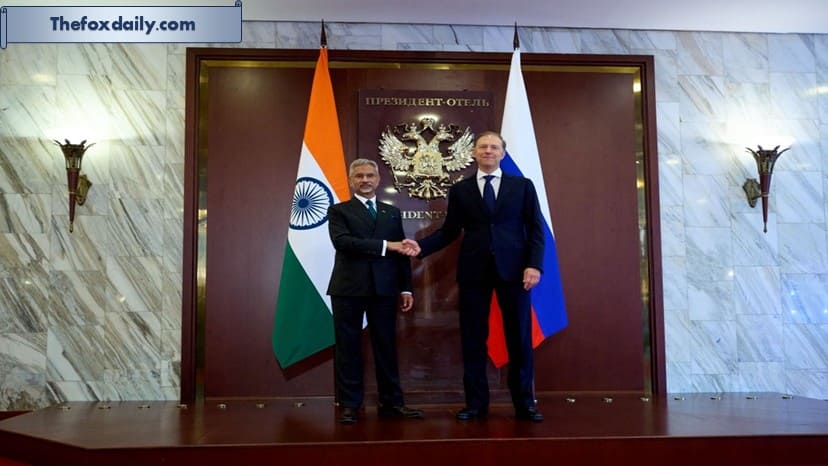
NEW DELHI: In the face of US threats of punitive action against energy trade between New Delhi and Moscow, External Affairs Minister S Jaishankar said Wednesday that India and Russia should take a “more creative and innovative approach” to address the challenges presented by a complex geopolitical situation. He was speaking as co-chair of a meeting of a bilateral economic panel.
In his remarks at the india-russia Inter-Governmental Commission for Trade, Economic, Scientific, Technological, and Cultural Cooperation (IRIGC-TEC) meeting in Moscow, Jaishankar also called for immediate action to rectify the stark disparity in trade between India and Russia and to diversify investment and trade between the two countries.
The meeting took place against the backdrop of the Donald Trump administration in the United States blasting energy trade between India and Russia. It was part of the preparations for Russian President Vladimir putin‘s scheduled visit to India later this year for a summit with Prime Minister Narendra Modi. In addition to a 25% reciprocal tax, the US plans to apply a 25% punitive tariff on Indian exports starting August 28 in response to Russian oil purchases.
Without mentioning US trade and tariff policy, Jaishankar stated, “We are all acutely aware that we are meeting in the backdrop of a complex geopolitical situation.” He recommended that in order to meet the challenges presented by the geopolitical landscape, the various working groups within the IRIGC-TEC should take a “more creative and innovative approach.”
Russian deputy prime minister Denis Manturov, who co-chaired the meeting, emphasised Moscow’s commitment to continuing to meet New Delhi’s energy needs. “We still ship fuel, such as coking coal, thermal coal, and crude oil and oil products. We see potential for the export of Russian LNG,” he said.
Concerns on the imbalance in two-way trade, which is mostly caused by imports of Russian energy while Indian exports have stagnated, were reaffirmed by the Indian side. Even though India’s exports were only worth $4.88 billion, bilateral trade hit a record of $68.7 billion in 2024–2025.
Jaishankar pointed out that while the gap has surged ninefold from $6.6 billion to $58.9 billion over the last four years, two-way trade in goods has more than fivefold increased. “Therefore, we must deal with that immediately,” he stated.
In order to address the imbalance and enable the two sides to reach the goal of increasing trade to $100 billion by 2030, he recommended that tariff and non-tariff trade barriers be addressed, logistics bottlenecks be removed, connectivity be promoted through the Northern Sea Route, Chennai-Vladivostok Corridor, and International North-South Transport Corridor, and payment mechanisms be implemented smoothly.
In addition, Jaishankar demanded that the parameters of the free trade deal between India and the Eurasian Economic Union be finalized as soon as possible. According to him, the ease of trade settlements, trade basket diversification, the formation of additional joint ventures, and cooperation on professional mobility can all strengthen economic cooperation.
“We must avoid being mired on a beaten path. He called for the establishment of measurable goals and precise deadlines for trade and investment as well as for removing obstacles, saying, “Doing more and doing differently should be our mantras.”
Among the top bilateral decision-making bodies are the two intergovernmental commissions between Russia and India: one for defense and military cooperation, and the other for commerce and technology-related matters. In the upcoming weeks, the India-Russia Inter-Governmental Commission on Military Technical Cooperation will convene in New Delhi.
In addition to direct crude oil shipments, Manturov stated that the two countries are working together to extract and process hydrocarbons in India and Russia. “Based on the successful experience of the Kudankulam NPP construction project, we intend to expand comprehensive cooperation in the peaceful nuclear sector,” he stated.
In recent weeks, Putin and Modi have had two phone conversations to talk about the state of affairs in Ukraine and their relationship in general. It is also believed that they spoke over the phone about the consequences of the US administration’s conduct.
India’s bilateral defense connections and purchases of Russian energy have been justified by the external affairs ministry on the grounds that they are related to the nation’s energy and national security interests.
On the grounds that they are related to India’s energy and national security interests, the external affairs ministry has defended India’s bilateral defense relations and purchases of Russian energy.
For breaking news and live news updates, like us on Facebook or follow us on Twitter and Instagram. Read more on Latest India on thefoxdaily.com.





COMMENTS 0